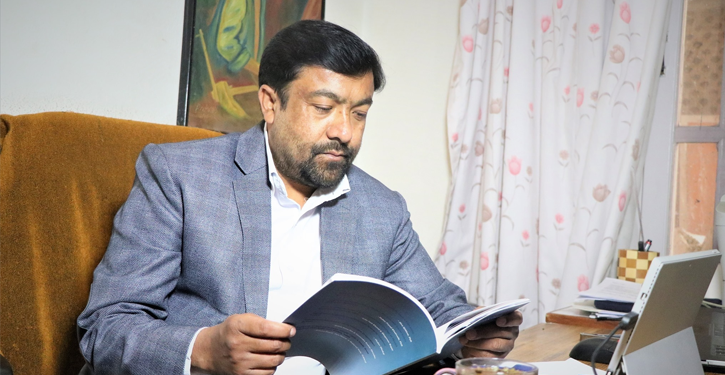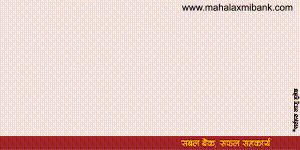About Us

Message from Editor-in-Chief
Nepal has seen significant political changes after promulgation of New Constitution 2072 which has transformed Nepal from the unitary model of governance to the Federal Republic with three spheres of Government. The constitution has also guaranteed several fundamental rights, affirmative provisions for Dalit and other vulnerable groups. The government has taken various legislative as well as policy initiatives to safeguard the rights of the Dalit community. While these changes have brought hope to the Dalit community that the process of transforming the feudal and patriarchal structures and establishing more inclusive and responsive governance has begun, however lack of participation of Dalit in Media and lack of coverage and sensitivity towards issues related with Dalit are still not adequately addressed which resulted inadequate and prejudicial coverage of news content in Nepali media relating to Dalit.
As Nepal is heading towards institutionalizing Federalism securing more responsive, accountable and inclusive governance, it is vital that the Nepali media advocate the issues of social inclusion as well as reflect the diversity of Nepali society giving adequate voice to the Dalit community who are suppressed and marginalized in every sphere of their life. Media, a true voice of the voiceless and pillar of democracy, needs to be more sensitive and responsive towards the issue of Dalit..
Despite the significant potential to promote social inclusion and sensitivity, the experience so far has been disappointing. Dalit representation in the mainstream media is mostly underrepresented at decision-making levels, in senior management positions, and in the news gathering and news dissemination processes in Nepal. In addition, caste based stereotypes are pervasive in program content and there is a lack of Dalit sensitive approach in Media in Nepal which results a very limited or biased reporting against Dalit issues. The concerns and agendas related to Dalit often don’t get adequate attention of the media. It is often felt that there is a sense of apathy on issues of Dalit in Nepali media. The media houses lack sensitivity towards Dalit and issues of Dalit to such an extent that the Dalit’s issues are subdued by editors and media houses
As the media in Nepal is heavily politicized, with partisan factions advocating their ideas through ostensibly independent organs, the majority of Nepali society feels that Nepali media only serve a dominant class at the expense of the marginalized social and ethnic groups. Dalit community still doesn’t have a voice or access to media as so often their issues are either not reported at all or reported with heavy bias and prejudice. The media have failed to reflect the diversity of Nepal as the journalists and media personnel are not practicing the concepts of pluralism and multi-cultural sensitivity.
Against this backdrop, the initiative of Dignity Post aimed at mainstreaming as well as amplify the voice of the Dalit and other vulnerable communities in South Asia and beyond. It will help to create solidarity for national and international advocacy on the issues, agendas and concerns of Dalit and other marginalized community.
About Dignity Post
Dignity Post (DP) is a global digital platform. It raises the voice of the voiceless people like Dalit and other marginalized communities living in South Asia and beyond. In other words, it is a digital window created to disseminate all the activities related to global social justice from a single platform for promoting inclusiveness, Human rights and democracy of Dalits and marginalized communities.
The DP raises the voice of those people who feel discriminated and cornored in the name of politics, religion, race and borders. To respect, every citizen’s right to live a dignified life we want to end all divisions fueled by conflict, civil war, intolerance and injustice. The Dignity Post will contribute to peace,justice, dignity and hope to the people by giving voice, strengthen to the oppressed and the marginalized sections of the society and changing social norms, attitudes towards Dalit and vulnerable groups. By promoting “Together for Change” approach and giving “Voice to the Voiceless” it will contribute to social cohesion, harmony and peace. Leaving no one behind from getting access to information is our key goal.
Like Dalit, data show about 260 million other marginalized people are struggling for dignity and social justice across the world.
The dignity Post’s main objective is to advocate for the rights of Dalit as well as others vulnerable DWD communities. DWD is the term used to address various forms of discrimination, including caste, work and birth-based discrimination. Many think DWD prevails only in the South Asian continent, but it’s everywhere in the world.
Affected communities face discrimination based on their birth into certain castes/social groups. And those occupying the lowest position in the social hierarchy are considered to be ‘unclean’. Communities have segregated living spaces, with severely restricted access to public and private services of housing, water and sanitation, health, education, land and employment. Typically associated with notions of ‘purity’ and ‘pollution’, this form of discrimination includes the practice of ‘Untouchability’, which imposes strong restrictions on the community. Consequently, human development indicators show a huge gap between the general population and DWD communities.
Considering the aforementioned discrimination the DP will strive for an equitable society for excluded people, we will raise the issues of Dalit, women, LGBTI, differently able people, indigenous, religious minorities, women trafficking, labor,slavery, migration, child rights, and marginalized people. We will connect them for mutual respect, dignity and social justice.
Dignity Talks
Dignity Talks is a YouTube Talks show. A section of disadvantaged groups, namely Dalit, women, LGBTIQ+, religious minorities, refugees, labor, child rights, slavery, violence affected people, and differently able people, have been historically excluded from their access to state mechanisms. They are exploited, deceived and deprived from exercising their rights like other socially benefited people. They can’t come out of social discrimination. Reason: them as they feel insecure, economically weak and inferior than other castes. So, Dignity Talks is a platform for promoting inclusiveness, human rights and democracy of Dalits and marginalized communities
Consequently, they have been facing a series of social and economic discrimination. Society never respect them, nor the mainstream media gives adequate coverage to raise their issues. Even as their contribution to the society is remarkable as compared to any others they never enjoyed respect in the society. Their contribution for the development of society is largely undermined.
For those communities, living dignified life still remains a matter of cry. They are not encouraged to continue the good work. In the given context Dignity Talks aims to give them adequate media coverage to voiceless Dalit, marginalized and minority people so that their voices could be heard. Leaving no one behind from getting access to information is our key goal.
Dignity Talks will share stories of dominated, discriminated, abused or socially exploited people. It will equally raise voice against rights violations of marginalized communities. Thus, it wants to inspire, empower, motivate and connect those people with modern society.
The aim of Dignity Talks is to create such an environment so that people will begin to respect each to other, end discrimination and inhuman acts. It aims to promote positive stories as well.
Rem Bahadur BK, Editor-in-Chief



